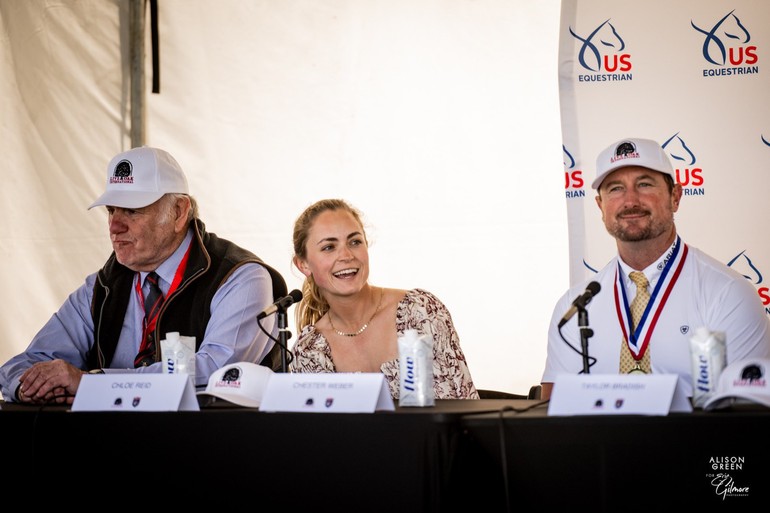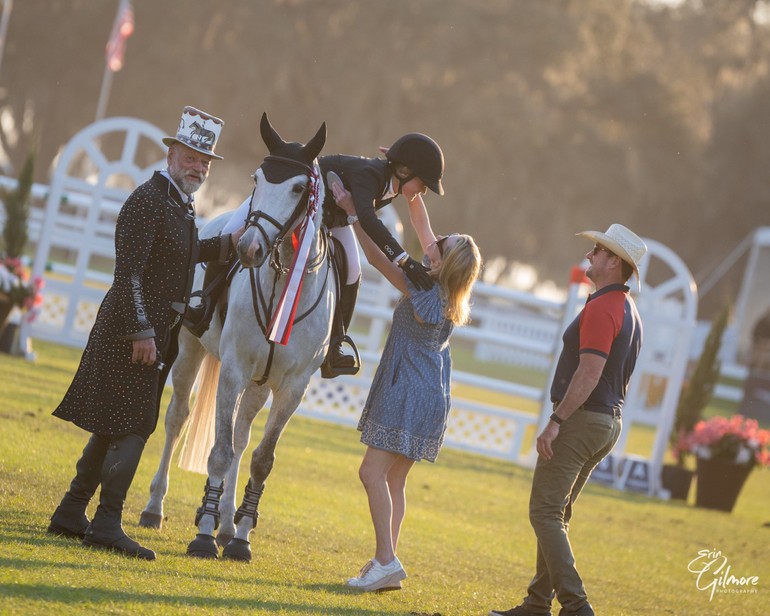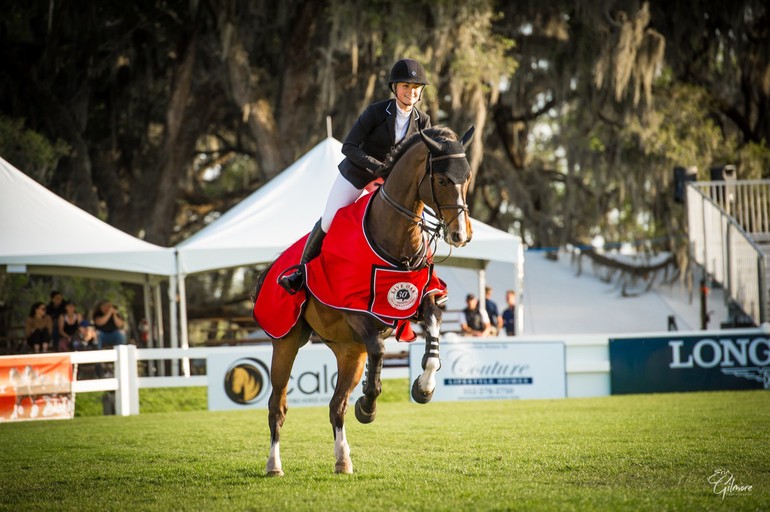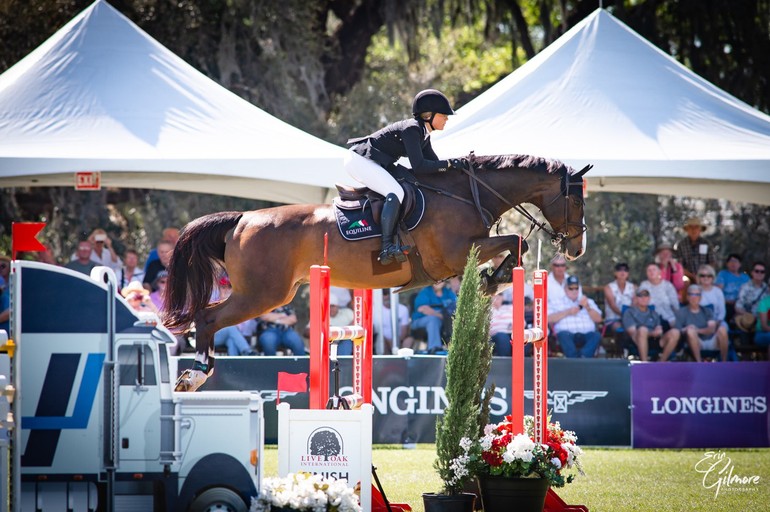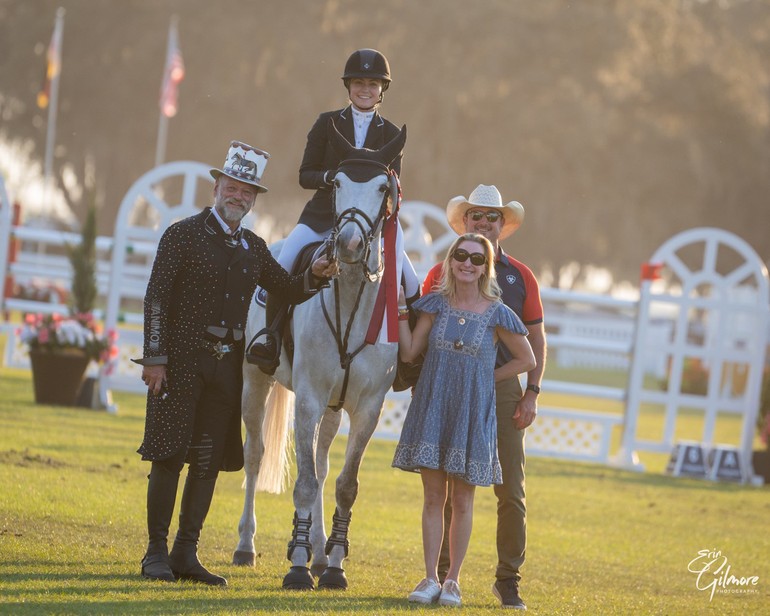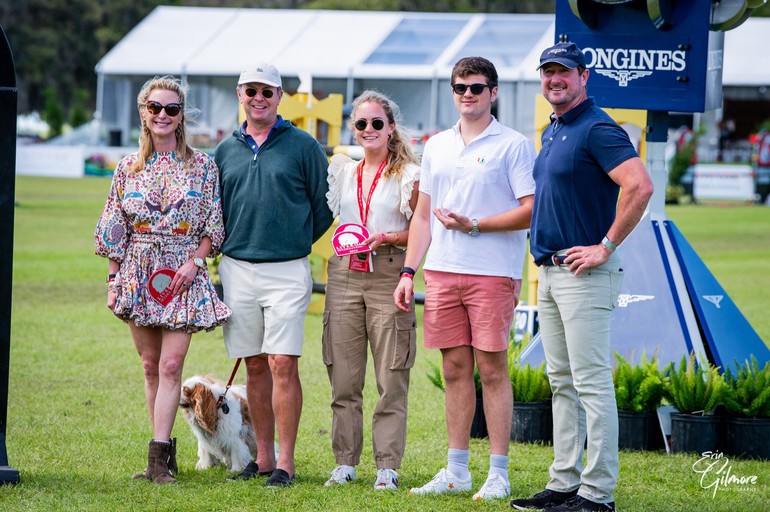Text © World of Showjumping
“There are a lot of changes happening in our sport and I am fortunate to be on both sides, not only as a rider but also as a show organizer,” Chloe Reid says. “I hope my presence in the sport is beneficial for its growth.”
As her family’s Live Oak Plantation in Ocala, Florida, moves on to its 33rd year of hosting showjumping events, Chloe tells World of Showjumping about her ever-changing role within the family operation, the challenges event organizers face and her vision for the future. With her insight into event organizing, the 27-year-old – who also competes actively and is currently 238th on the Longines Ranking – has a unique view on the sport. Having spent years in Europe training with Markus Beerbaum, Chloe is also familiar with the structure of the sport on both sides of the pond.
“I watched my mom, Juliet Reid, and my uncle, Chester Weber, run Live Oak International for many years and when my mom wanted to step back, I got more involved,” she explains. “She is still involved in running the tournament and I am fortunate to have her guidance. For the past two years, I have taken a larger role alongside Chester, learning more about the rules and all the pieces in the puzzle to make a successful event. I don’t think people realize how much work goes into hosting a show or how much I am involved.”
From driving to showjumping
Originally, Chloe’s grandmother Charlotte Weber started hosting driving competitions at Live Oak Plantation. “It all started as a driving show at a facility just down the road from us,” Chloe tells about a story that began over three decades ago. “The show needed another location for their driving marathon and as my grandmother’s property here in Ocala has plenty of space, they asked her if they could move the marathon portion of their event here. They did that for a few years and when Chester got involved then they moved the whole show to our property. I was here about 15 years ago, watching Chester compete and asked my mom why we have this beautiful ring and nice footing but we don’t jump on this field, too? And that was the beginning of adding showjumping to the mix. At the time, my mom was helping with the Washington International Horse Show, so she had experience in running showjumping events – and it all took off from there.”
Both Chloe and Chester compete actively – Chloe in showjumping and Chester in driving – and are keen to improve their event through their own experiences. “We both travel the world and are very fortunate to be able to attend the best shows globally,” Chloe tells. “As we walk around other shows, we like to see what events are doing and to bring the positives back home to improve our facilities. Whenever I am showing, I always find myself taking photos of all the little details – for example where the water taps are in the stables, nice things events do for the grooms or VIP decor. Anything I find other people are doing really well, I want to bring that back and add it to our show to make it the best we possibly can.”
With her years spent in Europe, Chloe has implemented some of the more European features to their event at Live Oak. “I think our show schedule is more European than American, as we have jumping from Friday afternoon to Sunday, whereas the jog in Wellington is on Tuesday and you start competing on Wednesday. We like to keep it shorter and more compact; I love in Europe how it is always a weekend of top sport, it is only a couple of days of really high competition and I think people really enjoy that. It is like a holiday when you get to be home at the beginning of the week and enjoy a high-level show on the weekend; I hope it is a breath of fresh air for everyone.”
Increasing costs
A whole discussion at the 2023 FEI Sports Forum was dedicated to the rising costs related to jumping events and Live Oak International had two staff members present in Lausanne for this session. “We have had a lot of talks internally,” Chloe tells. “As an organizer, I understand the need to charge riders for different services – like the lorry parking or higher entries. As an example, some OCs might need to rent land to have sufficient space to park in the first place. There are so many aspects to this discussion, from the amount of officials we are required to hire to the different safety and biosecurity measures. When you think about the number of officials, it means a hotel every night, meals every day, cars and travel for all of them. There are many moving pieces involved in the increasing fees. I see both sides of the argument when it comes to the rising costs. I think it is going to take time as well as help from the national federations, the FEI, and from the different OCs, to make the situation financially feasible for everyone.”
“Shows in America are more expensive to enter, but they also have more prize money, so I think it evens out in the end,” Chloe continues about the difference between Europe and America. “In Europe, a three-star Grand Prix would have 50,000 Euro in prize money and in the US, it would be a $150,000 class. American shows charge a higher entry fee to host larger money classes.”
The mileage-rule
As a US-based show, the American mileage rule is another, added, challenge for Chloe and her team at Live Oak International as this USEF-rule limits the number of shows at the same level held in close proximity. While the geographic distance needed varies from discipline to discipline and across different levels, exemptions can be requested as well. It has been argued that originally, the goal of the rule was to gather top riders in one destination, while simultaneously encouraging a wide range of locations.
“Our sport has grown, especially in Florida, and I think we are a little bit outdated with this rule now,” Chloe says. “As an example, Wellington owns most of the competition dates in the winter, so you basically cannot have a show at the same star-level within certain miles during their events. However, whether it is Live Oak International, WEF, HITS or Terranova, I think new locations and having more shows is only going to benefit the sport as a whole and push the different facilities to constantly improve to keep the demand of people.”
The prestige and pressure of the World Cup
For the last nine years, Live Oak International has hosted one of the eight legs in the Longines FEI Jumping World Cup North American League – a contract that will see its end in 2024. “Next year is our last year of organizing the World Cup at Live Oak and it has been a big honour to host a leg of this series," Chloe says. "There are only eight legs in America, so it is special to be picked and we have been the final leg of the series here – which has made it even more exciting with some riders seeking those last-minute points. Last year, with the final in Omaha, there were quite a few riders who wanted to come to our event to get the last points needed to qualify. Hosting the World Cup lifts the prestige of our event even higher and working with the FEI and Longines brings a whole new level of pressure as well. Last year, we were live on TV in 43 countries and starting our class in time like that adds fire under the belt. However, I have always thrived under pressure, and I think it makes the competition better for everyone.”
“Having lost the bid to host the World Cup after 2024 means the future of our tournament is unsure,” Chloe continues. “It frustrates me from an organizing point of view because we are a family-run event, we don’t run the show as a business – and we are not a 12-week multi-ring operation. We have one ring with one week of beautiful competition with the goal of improving the sport in America.”
“I think it is going to be interesting and I am happy that Ocala got the bid,” Chloe says about the fact that the World Equestrian Center in Ocala – less than 5 kilometres away from Live Oak – will host one of the four qualifiers in the inaugural Longines League of Nations next year – in addition to have also won the bid on hosting the World Cup from 2025 on. “I am curious how the format with only four qualifiers is going to work,” Chloe continues. “I don’t know if is going to be better, but it is new and great for Ocala to be receiving more top-level sport.”
All in
While it can be challenging for the lower ranked athletes to know where they get to compete, there is no shortage of shows – a point that according to Chloe, has both pros and cons. In 2023, the FEI calendar included 79 five-star shows, 69 four-star shows, 154 three-star shows and 349 two-star shows. “I do think that we are very fortunate that there are so many competitions,” Chloe continues. “There are so many different tours and big finals that we can aim for, which is great. However, sometimes I worry there is so much going on that we lose sight of what really are the most important occasions. When it comes to the wider audience, I think this might be one of our issues that is hurting our sport from attracting the mass audience’s attention. It is not easy to follow for someone who is not familiar with the sport. I would love for our sport to have a larger presence in mainstream media, not just the equestrian world. Most of our sport is still not live for the general public. It would be great for us to be live on TV at a good hour like football or tennis. Also, I wish our athletes – both human and equine – would be valued and seen as the top athletes that we are.”
While the rising costs are an issue in common for both the organizers and the athletes, what Chloe finds the most challenging as a rider is finding good horses and making the best plan for her team. “As a rider what will always remain a challenge is making sure all the pieces of my team are working together smoothly. You need a good vet, a good farrier, a good groom, to be in good health yourself and your horse. Everything needs to be hand in hand and if one piece of the puzzle isn’t working then you won’t be successful.”
Choosing which events to attend as an athlete not ranked in the top thirty is something that Chloe also finds to be a balancing act. “I always want to peak my horses at the best show for their strengths, but it is sometimes hard to know where you will get to compete when you don’t have a top ranking,” she points out. “The FEI has riders fill in a wish list of which shows we want to attend, and I think many people apply to the same shows and withdraw last minute so it is hard to know where you will get in. I guess that will always be a part of the game; the waiting and seeing. I don’t have a massive string of horses and my ranking is not that high, so for me it is about competing where I can. I always want to peak my horses when they are ready and feeling best so making a good plan is something I am always working to improve."
“I am a competitive person and if it is my riding or event organizing, I am going to give it a 100%,” Chloe concludes. “My goal as an event organizer is to make Live Oak International the best boutique tournament of sport to grow showjumping in the United States. My goals professionally are to continue to develop young horses and bring them to the top level to represent my country. Both take a lot of patience and hard work, but I am fortunate to do what I love every day!”
30.11.2023 No reproduction of any of the content in this article will be accepted without a written permission, all rights reserved © World of Showjumping.com. If copyright violations occur, a penalty fee will apply.



